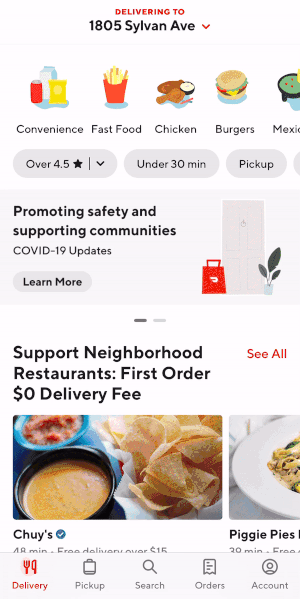DoorDash announced today that it is expanding its food delivery operations into the convenience store category. The delivery service has partnered with regional and national convenience stores such as 7-Eleven, Wawa, Casey’s General Store, and CircleK to drop off items like sodas, snacks and over-the-counter medicine at your door (with no human-to-human contact, of course).
DoorDash didn’t say specifically where in the U.S. its new convenience delivery is available, only that it added more than 1,800 stores to its platform. Where available, DoorDash users will see a “Convenience” icon or banner in the app. Upon clicking that banner, you can shop for the packaged goods you’d normally buy at a convenience store.
In a corporate blog post announcing the new service category, DoorDash’s Head of Grocery Partnerships, Mike Goldblatt, and Fuad Hannon, the company’s Head of New Business Verticals, wrote that DoorDash piloted the service earlier this year but has accelerated its official launch to accommodate needs “during a time when delivery and pickup are vital to consumers’ wellbeing and to the health of our local communities.” See also: global pandemic upending pretty much every aspect of our everyday lives and every previous business plan for startups.

Another good reason for DoorDash to expand its service categories is that its main clientele, the restaurant industry, is in the midst of an unprecedented collapse. Social distancing has forced the closure of restaurant dining rooms across the country. While some are pivoting to delivery only, the economics of restaurants relying on third-party delivery services like DoorDash remains to be seen.
Coincidentally, DoorDash’s announcement comes on the same day that Uber Eats announced it was expanding into more grocery delivery via convenience stores in France, Spain and Portugal.
Providing groceries via convenience stores make a lot of sense for third-party delivery services like DoorDash and Uber Eats. They can fulfill quick-hit food needs that aren’t full-on supermarket shopping trips. This not only allows for faster and therefore more deliveries (and more revenue), it also doesn’t turn delivery people into grocery shoppers wandering around a giant supermarket, hand-selecting produce, chips, etc.
Of course, at a time when delivery services grocery stores and through Instacart are being slammed with new users, having this type of quick hit delivery for small things could relieve some pressure and provide relief for those stuck at home.
The coronavirus outbreak is accelerating a lot of changes to food tech businesses. DoorDash’s expansion into convenience stores is just among the many we’ll be seeing as this pandemic continues.











